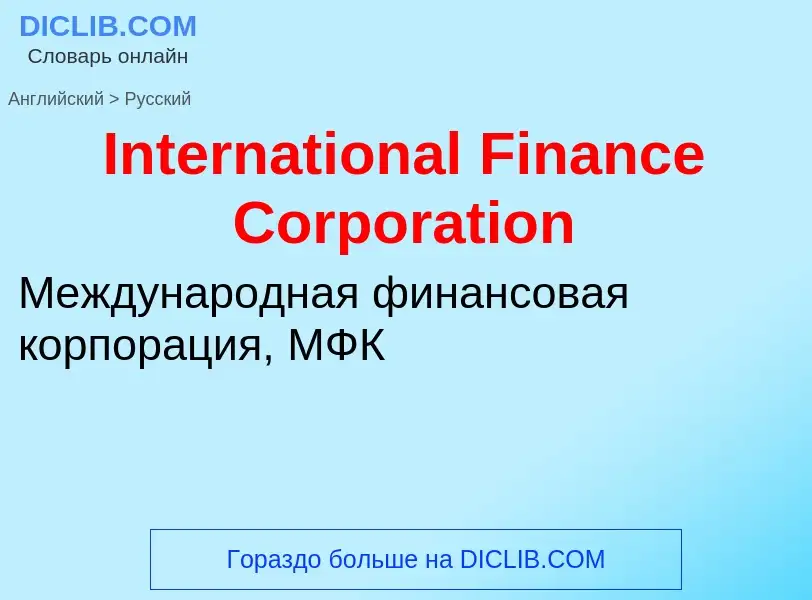Translation and analysis of words by ChatGPT artificial intelligence
On this page you can get a detailed analysis of a word or phrase, produced by the best artificial intelligence technology to date:
- how the word is used
- frequency of use
- it is used more often in oral or written speech
- word translation options
- usage examples (several phrases with translation)
- etymology
International Finance Corporation - translation to russian
2) pl финансы; доходы; средства
- raise the finances
- run the country's finance
- finances of state
- big finance
- committed finances
- compensatory finance
- corporate finances
- deficit finances
- farm finances
- high finance
- intergovernmental finances
- public finances
- sound finances
Definition
Wikipedia
The International Finance Corporation (IFC) is an international financial institution that offers investment, advisory, and asset-management services to encourage private-sector development in less developed countries. The IFC is a member of the World Bank Group and is headquartered in Washington, D.C. in the United States.
It was established in 1956, as the private-sector arm of the World Bank Group, to advance economic development by investing in for-profit and commercial projects for poverty reduction and promoting development. The IFC's stated aim is to create opportunities for people to escape poverty and achieve better living standards by mobilizing financial resources for private enterprise, promoting accessible and competitive markets, supporting businesses and other private-sector entities, and creating jobs and delivering necessary services to those who are poverty stricken or otherwise vulnerable.
Since 2009, the IFC has focused on a set of development goals that its projects are expected to target. Its goals are to increase sustainable agriculture opportunities, improve healthcare and education, increase access to financing for microfinance and business clients, advance infrastructure, help small businesses grow revenues, and invest in climate health.
The IFC is owned and governed by its member countries but has its own executive leadership and staff that conduct its normal business operations. It is a corporation whose shareholders are member governments that provide paid-in capital and have the right to vote on its matters. Originally, it was more financially integrated with the World Bank Group, but later, the IFC was established separately and eventually became authorized to operate as a financially autonomous entity and make independent investment decisions.
It offers an array of debt and equity financing services and helps companies face their risk exposures while refraining from participating in a management capacity. The corporation also offers advice to companies on making decisions, evaluating their impact on the environment and society, and being responsible. It advises governments on building infrastructure and partnerships to further support private sector development.
The corporation is assessed by an independent evaluator each year. In 2011, its evaluation report recognized that its investments performed well and reduced poverty, but recommended that the corporation define poverty and expected outcomes more explicitly to better-understand its effectiveness and approach poverty reduction more strategically. The corporation's total investments in 2011 amounted to $18.66 billion. It committed $820 million to advisory services for 642 projects in 2011, and held $24.5 billion worth of liquid assets. The IFC is in good financial standing and received the highest ratings from two independent credit rating agencies in 2018.
IFC comes under frequent criticism from NGOs that it is not able to track its money because of its use of financial intermediaries. For example, a report by Oxfam International and other NGOs in 2015, "The Suffering of Others," found the IFC was not performing enough due diligence and managing risk in many of its investments in third-party lenders.
Other criticism focuses on IFC working excessively with large companies or wealthy individuals already able to finance their investments without help from public institutions such as IFC, and such investments do not have an adequate positive development impact. An example often cited by NGOs and critical journalists is IFC granting financing to a Saudi prince for a five-star hotel in Ghana.


![A young shuttle driver at the [[Allis-Chalmers]] [[Supercharger]] plant in Milwaukee (October 1942) A young shuttle driver at the [[Allis-Chalmers]] [[Supercharger]] plant in Milwaukee (October 1942)](https://commons.wikimedia.org/wiki/Special:FilePath/Jewel Halliday (Oct 1942).jpg?width=200)



![Bond]] issued by The Baltimore and Ohio Railroad. Bonds are a form of borrowing used by corporations to finance their operations. Bond]] issued by The Baltimore and Ohio Railroad. Bonds are a form of borrowing used by corporations to finance their operations.](https://commons.wikimedia.org/wiki/Special:FilePath/1925.B&O.Railroad.Stock.Louis.Brandeis.jpg?width=200)
![Congress]] Congress]]](https://commons.wikimedia.org/wiki/Special:FilePath/20071203-Bush speech on budget Rose Garden.jpg?width=200)

![Oil traders]], Houston, 2009 Oil traders]], Houston, 2009](https://commons.wikimedia.org/wiki/Special:FilePath/A1 Houston Office Oil Traders on Monday.jpg?width=200)
![Corn Futures]] market, 1993 Corn Futures]] market, 1993](https://commons.wikimedia.org/wiki/Special:FilePath/Chicago bot.jpg?width=200)
![Crowds gathering outside the New York Stock Exchange after the [[Wall Street Crash of 1929]] Crowds gathering outside the New York Stock Exchange after the [[Wall Street Crash of 1929]]](https://commons.wikimedia.org/wiki/Special:FilePath/Crowds gathering outside New York Stock Exchange (4).jpg?width=200)
![[[Dōjima Rice Exchange]], the world's first [[futures exchange]], established in [[Osaka]] in 1697 [[Dōjima Rice Exchange]], the world's first [[futures exchange]], established in [[Osaka]] in 1697](https://commons.wikimedia.org/wiki/Special:FilePath/Dojima-Rice-Exchange-Osaka-by-Yoshimitsu-Sasaki.png?width=200)

![traders]] floor c 1960, before the introduction of electronic readouts and computer screens traders]] floor c 1960, before the introduction of electronic readouts and computer screens](https://commons.wikimedia.org/wiki/Special:FilePath/NY stock exchange traders floor LC-U9-10548-6.jpg?width=200)
![Customers queuing outside a [[Northern Rock]] branch in the [[United Kingdom]] to withdraw their savings during the [[financial crisis of 2007–2008]] Customers queuing outside a [[Northern Rock]] branch in the [[United Kingdom]] to withdraw their savings during the [[financial crisis of 2007–2008]]](https://commons.wikimedia.org/wiki/Special:FilePath/Northern Rock Queue.jpg?width=200)
![local]] and [[stochastic volatility]] models to incorporate the [[volatility surface]]. local]] and [[stochastic volatility]] models to incorporate the [[volatility surface]].](https://commons.wikimedia.org/wiki/Special:FilePath/OAS valuation tree (es).png?width=200)
![[[Share certificate]] dated 1913 issued by the Radium Hill Company [[Share certificate]] dated 1913 issued by the Radium Hill Company](https://commons.wikimedia.org/wiki/Special:FilePath/Radium Hill share certificate.jpg?width=200)
![[[Share price]]s listed in a Korean Newspaper [[Share price]]s listed in a Korean Newspaper](https://commons.wikimedia.org/wiki/Special:FilePath/Stock Price Listing Numbers on a Korean Newspaper.jpg?width=200)
![financial advisor]] counsels the client on an appropriate [[investment strategy]] financial advisor]] counsels the client on an appropriate [[investment strategy]]](https://commons.wikimedia.org/wiki/Special:FilePath/Wealth Management Consultation.jpg?width=200)
